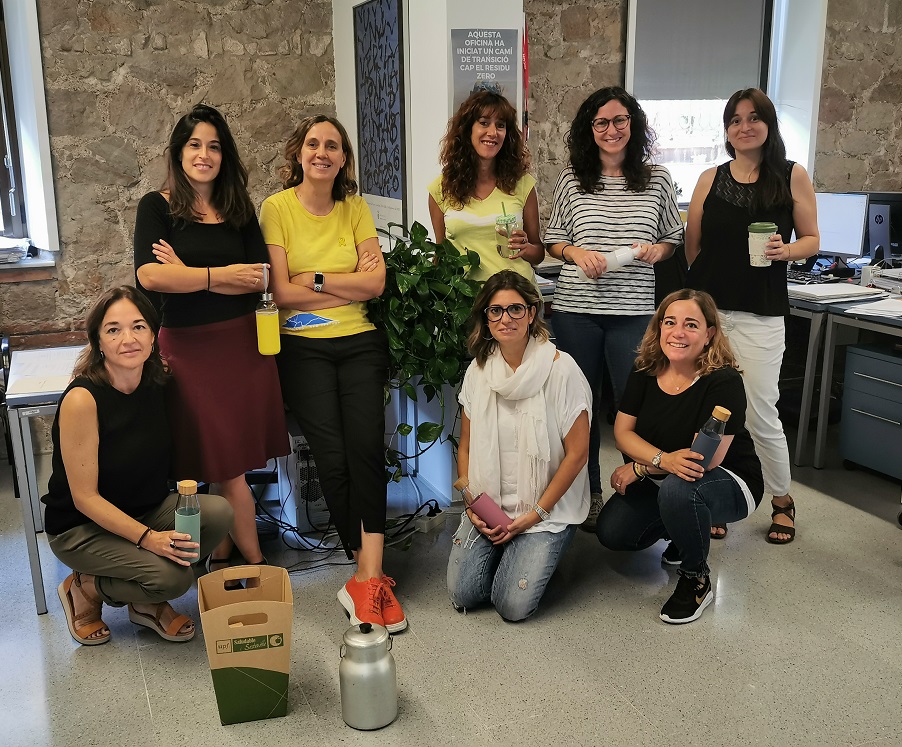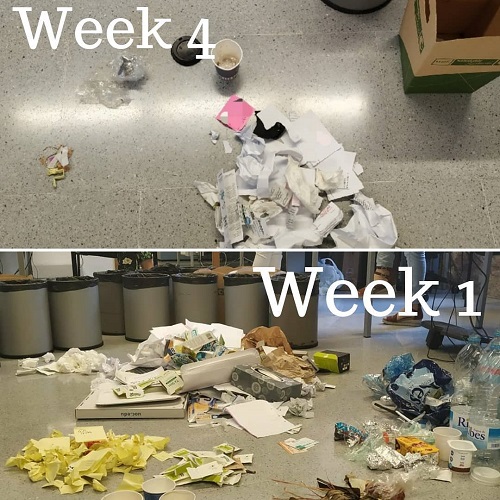“Integrating a culture of 'less is more' is very difficult for Western society”
“Integrating a culture of 'less is more' is very difficult for Western society”
The administration and services staff of the UPF Postgraduate and Doctoral Studies Office is implementing “The Zero Waste Office”, a pioneering project at the University to make the transition to zero waste.

The Zero Waste Office (@lazerowasteoffice) is a project being implemented by the administration and services staff (PAS) of the Pompeu Fabra University Postgraduate and Doctoral Studies Office, which aims to make the transition to zero waste.
It is a pioneering initiative at UPF, which was launched in May 2019 and aims to be an incentive for other services and individuals in the university community to join in this challenge.
The project promoted by Anna de Golferichs, an office employee, immediately received the support of her superior, Marta Aragay, as well as that of all of her workmates, since to succeed, teamwork is essential.
“The Zero Waste Office”, which was one of the finalists of the 2019 edition of the University Responsibility Competition, announced by the UPF Board of Trustees, is part of the different actions and commitments of the University around climate emergency, which include mitigating the ecological footprint.
—How and when did the idea arise? Is it limited to offices?
(Marta Aragay): As with many things in life, the initiative came from one of the employees at the office, Anna de Golferichs, who had been telling us about zero waste for some time. Finally, one day she proposed taking a step forward. It was important to have the commitment of the entire office, and as a boss, I thought the planet would appreciate it and that it could be a good way to keep building our team. We quickly saw that the changes in the office forced us to change habits at home: sustainability knows no borders and if you are sustainable at work, you will end up also being sustainable at home.
“Sustainability knows no borders and if you are sustainable at work, you will end up also being sustainable at home”.
—What is your ultimate goal?
(M.A.) There is no ultimate goal, the project is constantly changing. Its main purpose is to integrate the culture of and raise awareness about the need for zero waste. However, we would like the frontier not to be at the doors of our office. We could say that our ultimate goal is for the UPF community to also adopt such measures.

—How have you managed to achieve such a drastic reduction in waste? Have you used any kind of practical guidelines?
(Anna de Golferichs) The first step we took was to remove the waste bins and use just one for the whole office. This measure was so drastic that the results were quickly apparent. Regarding the guidelines, I proposed commitments and challenges every week, just following my personal experience with the zero-waste lifestyle. It is a process of creative, open transition that must be capable of adapting to the dynamics of each team.
—How have you used Instagram to see the results?
(A.G.) Instagram has been essential as a tool to motivate our colleagues. My idea was to convince the whole office that everyone can become an influencer capable of changing the world, or at least our little world. Also, Instagram has served not only to document what we are doing, but also to create a network with the zero-waste community and to publicize the project beyond the office space.
“My idea was to convince the whole office that everyone can become an influencer capable of changing the world, or at least our little world”.
—Has the office team had difficulty adapting? What is the level of commitment and what reluctance has arisen?
(A.G.) It was not easy; each of us has encountered the need to break with patterns that we had in-built and which we were not aware of. We have tried to find a constant balance between the goal and adaptation by each person. In this regard, the project is a very good tool for teamwork and the development of interpersonal communication skills.
—Could you outline some of the main measures and changes you have implemented to eliminate waste?
(A.G.) To achieve a significant reduction in waste the first step is to analyse which waste you generate. In our case we started by eliminating plastic bottles and packaging. Other measures we have implemented have been to limit the use of environmentally unfriendly office supplies (in fact, we are seeking more sustainable alternatives) and also to analyse the administrative processes we manage to digitize them and avoid printing insofar as possible.
—Which are the main difficulties you have encountered?
(A.G.) Raising awareness in all we do to integrate sustainability criteria. It is not always easy to look for a sustainable alternative and we must resist the urge to keep buying easily accessible products that are not environmentally friendly.
—Which materials and items has it been most difficult to do without?
(A.G.) Pens. When I proposed limiting the number of writing media, I was aware of the difficulty involved in giving up the principle of accumulation: integrating a culture of “less is more” is very difficult for Western society.
“Integrating a culture of “less is more” is very difficult for Western society”.
—Can this initiative be extrapolated to other UPF services and areas?
(A.G.) That’s what we desire. We believe that as members of the university community we have the chance to convey an important message to the whole of society.
—Are the university community and society in general sufficiently aware of the importance of reducing waste?
(A.G.) We do not have a culture of waste, in fact many people confuse reducing waste with recycling, and that’s not what it’s about. In the 90s, we fought for recycling, and in 2020 we must fight to reduce waste and to stimulate a culture of the circular economy, in which the material of the item returns to earth.
—Is it a way of conduct that can be imposed or does individual freedom prevail?
(A.G.) Waste reduction should be regulated through laws. At the same time, freedom must always prevail in a system in which exercising this freedom is not synonymous with the destruction of the planet.
—What degree of responsibility falls with the consumer, enterprise and politicians in the excess of waste?
(A.G.) This is something we have discussed at length in the office. In a world where individualism prevails, it may seem that sustainability is an individual responsibility but this is not so. As citizens, we take important decisions in our daily lives, but governing bodies, whether state-wide or institutional, must pass laws so that the citizens can live in a sustainable context. Those in power must exercise their power to stop climate change.
Those in power must exercise their power to stop climate change.
—What other measures do you think could be implemented by the University to fight climate emergency?
(A.G.) Important steps are being taken such as limiting plastics in the cafeteria, but we must now wait and see if there is indeed a significant reduction in waste. We propose limiting and looking for alternatives to office supplies, but the most important measure is to build a culture of sustainability. We need to educate and feel part of the project, we must believe that we can be a driving force for change.
